Sewage system inside and outside the apartment
If you live in an apartment, you will undoubtedly use the services of the urban central sewer system and, most likely, do not even think about the features of its functions from a technical point of view. And in vain. After all, an understanding of how urban sewage works will lead to its more efficient and uninterrupted operation.
Therefore, in this article we will provide you with all the necessary information for this.
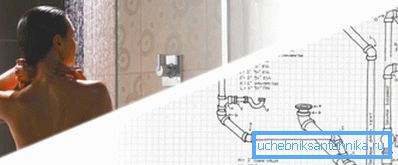
Sewage system in the apartment
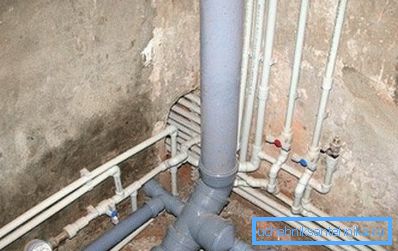
First of all, we will look at how the drainage system is being constructed within the boundaries of an apartment building, and only then, how the sewage system is arranged in the city.
Correct pipe slope

The pipeline is installed in such a way that it can self-clean, aided by proper observance of the angle of its elements. In the apartments for its implementation are usually used sewer pipes with a diameter of 40-50 mm, and so for them the optimal slope is 3%, which is 3 cm per each meter of the system. Otherwise, the following problems will be expected:
| Bias | Effects |
| Less than 3% | Water will drain too slowly, without being able to wash out all insoluble particles that have fallen into the waste water. |
| More than 3% | In this case, on the contrary, the pressure is formed excessively strong, and the liquid will not have time to take along all the garbage. |
In both cases, apartment owners will face technical blockages in the sewage system, which can only be eliminated by replacing incorrectly installed elements.
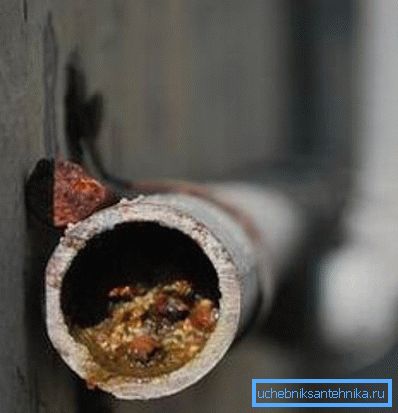
Connect to a common riser
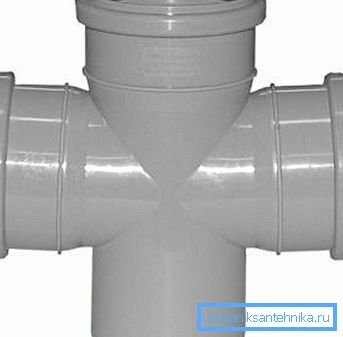
The entrance to the general sewage system from the apartment is only one and it is carried out with the help of a special cross, which allows you to connect one pipe with a diameter of 100 mm and two pipes with diameters of 50 mm, but let's talk about this in more detail.
Instruction:
- A toilet and a bidet are connected to the main widest hole.
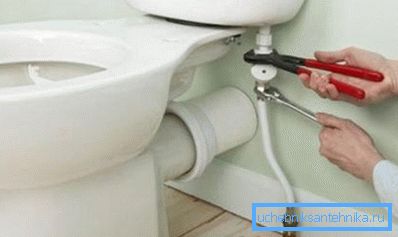
- All other sanitary appliances in the bathroom and toilet, including a washing machine and a shower stall, are connected to one of the fifty-millimeter entrances.
- To the second - all kitchen devices, including a dishwasher.
Installation height of sanitary devices
Since the entire pipeline has a certain slope in the direction of the main line, then, the further the equipment is connected from the riser, the higher it should be raised. The only exceptions to this rule are washing machines and dishwashers, since they have their own centrifugal pumps, which push out pressurized liquid, and can even be located below the inlet to the common sewer.
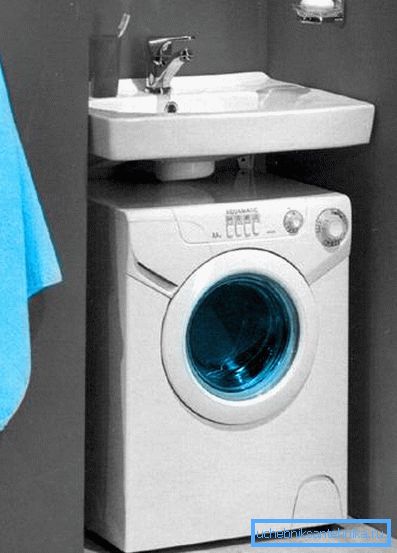
Tip: it is recommended to install washing machine and dishwasher in the most remote corner. This will allow you to put the equipment that needs an appropriate lift closer.
Pipe selection
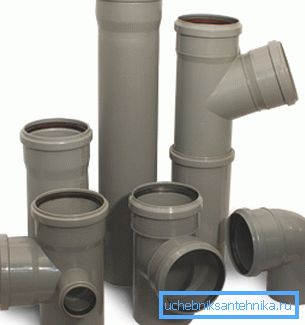
The use of cast iron products to create a pipeline has long been outdated, for this purpose various types of polymer representatives are much better suited: polypropylene, polyethylene or polyvinyl chloride pipes.
They have the following benefits:
- Affordable price. Plastic is always cheaper than metal.
- Absolute moisture resistance. Completely no corrosion or decay processes.
- Little weight. Eliminates additional load on fasteners.
- Easy operation and handling. All elements are connected by hand and easily shortened if necessary.
Tip: when connecting the chamfer and the coupling after the docking is done closely, pull the pipe back a little, about 15 mm. So you will provide a compensation gap at the time of thermal expansion of the material. In the opposite case, pipes can skew when hot water passes through them, from which the joint will leak.
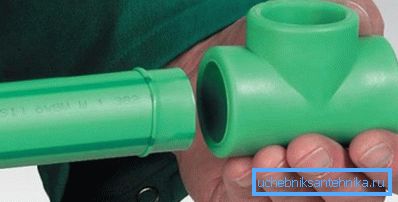
- Ability to equip noise insulation. And the noise of the liquid running through the pipes will not bother you day or night.
Corner joints
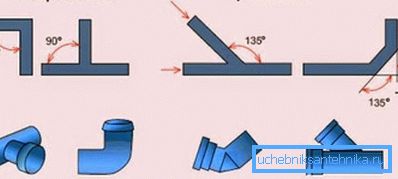
Here, everything is quite simple: right angles are the causes of sewer blockages and slow down the movement of wastewater, so they should be avoided. With this you will be perfectly helped by products bent under 135 degrees.
Water traps
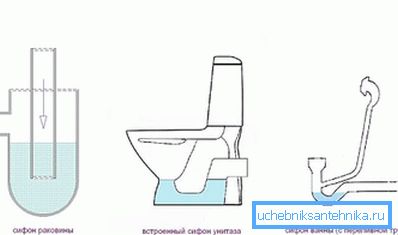
Sewerage exudes unpleasant odors that can penetrate pipes and into the living room. To prevent this from happening, a special water seal should be installed on each drain.
In the toilet, for example, such a constructive solution exists initially, for a sink and a bathtub it is installed in the form of siphons. The water plug formed in such devices due to the difference in the levels of the height of the inlet pipes reliably prevents the smelly odors from entering the apartment.
Tip: if you leave your home for a long time, pour some sunflower oil into the siphons. The film formed on the water in the traps will prevent its evaporation during your absence. Otherwise, you can return to a not very good smelling place.
Sewage system in the city
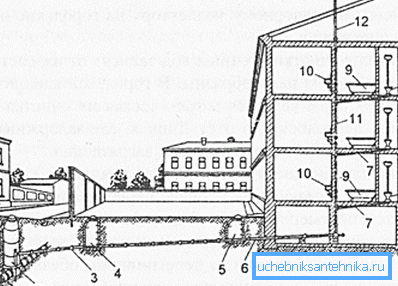
Let's take a look at how the sewage system looks on the scale of the whole of your high-rise building and the adjacent street:
- The main street highway. It is the wastewater that will go to the place of its treatment, which we will talk about in more detail later.
- Technical city well. The device wells sewage necessary for the implementation of maintenance and repair of the entire system.
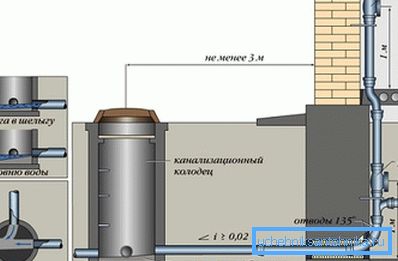
- The connecting branch between the yard and the city wells.
- Yard technical collector. It unites all the houses in the yard into a single network and, in addition to access to the system, also allows smoothing the turning corners.
- Inspection well. There is at each entrance separately.
- The site connecting the riser with a manhole.
- Internal pipelines of apartments.
- Toilets.
- Baths.
- Sinks.
- Riser.
- Sewer ventilation. It is necessary to ensure that the system does not accumulate discharged air, due to which water in the traps evaporates, which in turn leads to the penetration of unpleasant odors into the living rooms.
Wastewater
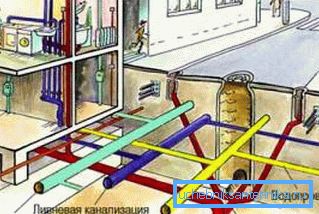
The sewer urban network outside the house, depending on the wastewater entering it, can be of two types:
| Sewerage type | Features of the movement of stocks |
| Public | Rain, melted and household together fall into the general highway |
| Separate | Rain and snowmelt move along individual drains into rivers and lakes without purification. |
As you can see, a separate system is much more profitable, since with it it is not necessary to process even precipitation.
Movement around the city
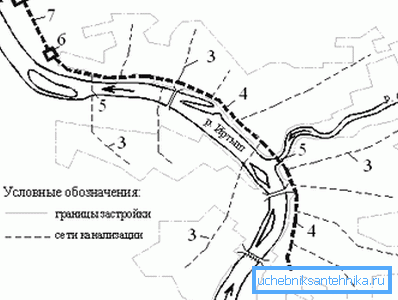
Elements of the city sewer line:
- Yard systems.
- Street wells.
- District collectors equipped with pumping stations, since it is not always possible to ensure sufficient pipe slope for the natural movement of sewage.
- Ducker also capable of pumping sewage.
- City pumping sewer station.
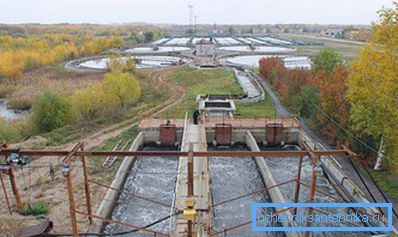
- Suburban part of the pipeline.
- Mechanical and biological cleaning facilities.
- Release to reservoirs.
Cleaning
We can distinguish the following main stages of purification of waste water passing through the city sewage system:
- Mechanical. Grilles, sand traps and septic tanks help to trap and separate the largest insoluble debris.
- Biological. It is carried out due to the action of microorganisms and can be of two types:
| Title | Description |
| Natural | In this case, all sewage falls on special filtration fields, where soil cleaning takes place. |
| Artificial | Much more complicated, but more effective:
|
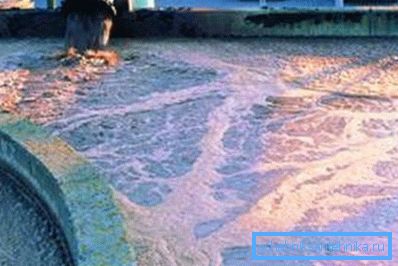
The artificial cleaning method has its drawbacks:
- electricity consumption;
- the need for maintenance;
- high implementation cost.
But does not harm the environment and does not require huge land areas, as is the case with the natural method.
Conclusion
The city sewer system starts from the sink, over which you wash your hands, and ends in the lake. And all this colossal way makes possible the set of its elements, which we considered above.
Malfunction, improper installation or operation of any of them can lead to a minor or major accident. Therefore, try to follow all the rules for the use of sewage.
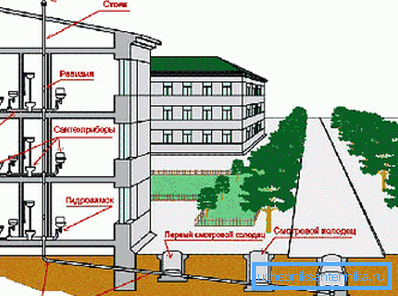
The video in this article will provide you with additional information directly related to the materials presented. Uninterrupted operation of the urban sewer system begins from your apartment.